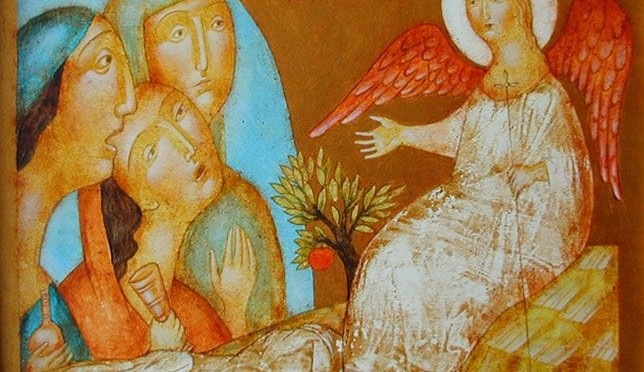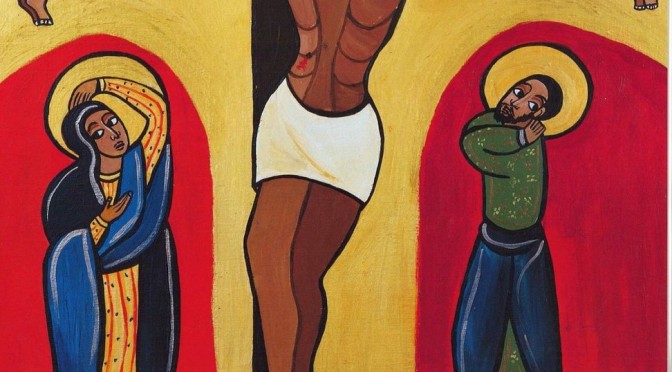**The Empty Tomb by Julia Stankova (2003) painting on wooden panel
Caitlin Trussell with Augustana Lutheran Church on March 31, 2024
[sermon begins after Bible reading]
Mark 16:1-8 When the sabbath was over, Mary Magdalene, and Mary the mother of James, and Salome bought spices, so that they might go and anoint [Jesus’ body]. 2And very early on the first day of the week, when the sun had risen, they went to the tomb. 3They had been saying to one another, “Who will roll away the stone for us from the entrance to the tomb?” 4When they looked up, they saw that the stone, which was very large, had already been rolled back. 5As they entered the tomb, they saw a young man, dressed in a white robe, sitting on the right side; and they were alarmed. 6But he said to them, “Do not be alarmed; you are looking for Jesus of Nazareth, who was crucified. He has been raised; he is not here. Look, there is the place they laid him. 7But go, tell his disciples and Peter that he is going ahead of you to Galilee; there you will see him, just as he told you.” 8So they went out and fled from the tomb, for terror and amazement had seized them; and they said nothing to anyone, for they were afraid.
[sermon begins]
There is classic question asked by Christians over the centuries. We regularly ask, “What does this mean?” The question invites wonder. We wonder about faith, scripture, Jesus, life, love, enemies, and more. Not only do we wonder, but sometimes we disagree. The disagreement isn’t always pretty – note that there are multiple flavors of Christians. But at its best, the question opens us to curiosity and wonder – “What does this mean?” The question is quite Biblical. In our Bible story this morning, Mary Magdalene, Salome, and Mary the mother of James, were in a whole heap of wonderment, reacting to the unknown and uncontrollable, and trying to make sense of a mystery. Because that’s what humans do. That’s what we do when we’ve been through the ringer like those women. It’s good to wonder.
The events leading up to Jesus’ death were shocking. He entered Jerusalem at the top of his game, his followers lined the parade route and waved palm branches, celebrating Jesus’ entrance into the city as if nothing could stop him. But he was stopped in dramatic fashion – betrayed, arrested, charged, tortured, denied, and nailed to a cross. Not just stopped. Stopped dead. Small wonder that the women at the empty tomb couldn’t wrap their heads around it, they had watched their teacher and friend die three days before.[1] Jesus wasn’t surprised. He’d been predicting his death. His death was the inevitable end to his ministry of unconditional love and grace. Hate’s last gasp, if you will, because God’s love is that powerful. Hate will always try to do away with reckless love because it’s just too threatening to the powers that be. Love is unpredictable. Love is a wonder.
Wondering about Jesus’ death before he left behind an empty tomb helps us remember that it was not the violence of his death that redeems us. Nor was his death planned to appease an angry God or a hungry devil. Jesus’ execution was unavoidable.
While it’s hard enough to believe that there’s a God who loves you, it’s downright offensive that God loves your enemies as much as God loves you. This is what riled up the people who killed him. Even so, Jesus’ death reminds us that God will not raise a hand in violence against us, even when we try to kill God. Jesus is the incarnation of God, taking violence into himself on the cross, transforming death through SELF-sacrifice, and revealing a divine love powerful enough to leave behind an empty tomb.
Those women at the tomb, what chance did they have describing such an unexplainable, wild thing after everything they’d just gone through. It’s no surprise that they fled the tomb in terror and wonder, silenced by their own fear. On Easter, we gather in wonder alongside those women. We are not so different from them, really. Making sense of an empty tomb? What does it mean? What could it mean? The empty tomb is a wonder.
The empty tomb was so full of wonder that it silenced the women. “They said nothing to anyone, for they were afraid.” Fear and silence were their starting point, but we must assume that one of them finally broke. In the weeks, months, and years after Jesus’ birth, ministry, crucifixion, and resurrection, Jesus’ followers told the story bit by bit, sharing it with each other and then more people, and finally writing it down. Theirs was a similar process to ours. Shaky with doubt or trusting and celebratory this Easter, we seek to understand the promises of the cross and resurrection by asking what they mean. Slowly, a piece of evidence here, an observant comment there, a Bible story now aligning with a random story you heard but can’t remember where, finally an experience in your life that ties the pieces together. Our stories are a wonder.
There is a story for each of us. Of course there is, even if we don’t think of it that way. In fact, I’d guess that if I were to ask you whether your story is worthy, you may say, “yes,” but also silently wonder about whether it is truly worthy or whether you yourself are worthy. There are many messages out there that other people’s stories are more important than our own – at school, at work, on the medias, in the movies. Those messages that elevate others at the expense of our own story are lies.
Each of our stories is about a life that God so loves. If, as the Bible says, God so loves the world, and you’re in the world, your life is worthy of God’s love, and worthy of love period. There’s no Venn diagram. Just one big circle, well, more like a planet…or actually, no, bigger than a planet…let’s go with universe, yeah, that’s it, universe! You, your life, your story, no matter how beautiful or messy or messed up it may be, is worthy of the love of God. You are a wonder.
Sometimes that seems to be the hardest thing to believe – that you are worthy of love – deep down in the darkness, in whatever tomb you’ve enclosed yourself in, shrouded in the illusion of safety. The wonder of it all is that God loves you first. Before you wake up in the morning. Before you make your first move. When you make your first move. You are beloved. We make it all kinds of complicated, but it really is that simple. We cannot screw it up or alter God’s love in any way. People will try to tell you that you can. That there’s a limit to how much even God can love. But the message of the cross and the empty tomb is that there is no limit to how much God loves you. That is the Easter promise worth the wonder. Alleluia. And amen.
_____________________________________
[1] Mark 15:40-41



![Who has been Jesus for you? John 3:14-21 [OR Would Someone Please Put John 3:17 on the Poster, Too?]](https://caitlintrussell.org/wp-content/uploads/2024/03/Luke-Allsbrook-Jesus-Washes-the-Disciples-Feet.-2018-oil-on-canvas--672x372.jpg)